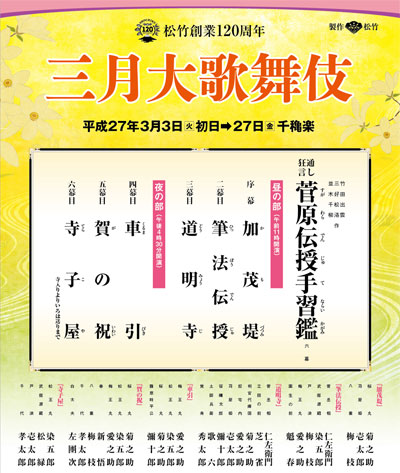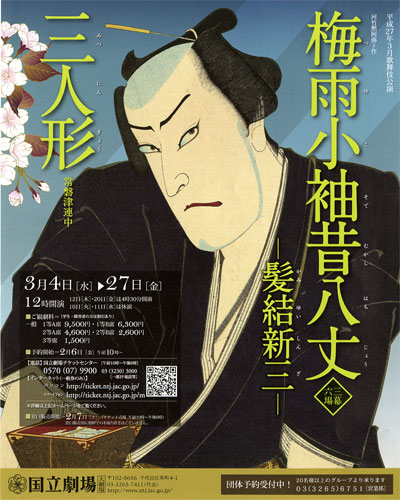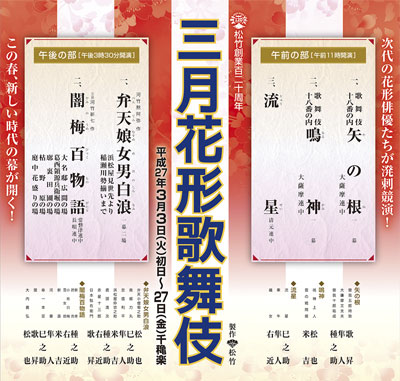| Comments |
The classic "Sugawara Denju Tenarai Kagami" is staged as a t˘shi ky˘gen for the March Grand Kabuki with a troupe led
by the zagashira Kataoka Nizaemon, who will play the role of Kan Sh˘j˘ in "Hipp˘ Denju" and "D˘my˘ji".
The roles of the brothers Matsu˘maru, Ume˘maru and Sakuramaru are played by Ichikawa Somegor˘, Kataoka Ainosuke and Onoe Kikunosuke.
Their wifes Chiyo, Haru and Yae are played by Kataoka Takatar˘, Band˘ Shingo and Nakamura Baishi. The roles of Shiratayű, Tatsuta-no-Mae, Shihei and Haji no Hy˘e will be played by Ichikawa Sadanji, Nakamura Shibajaku, Band˘ Yajűr˘ and Nakamura Karoku.
The role of Takebe Genz˘ in "Hipp˘ Denju" and "Terakoya" is played by two different actors, Ichikawa Somegor˘ in the former act and Onoe Sh˘roku in the latter act.
The role of Genz˘'s wife Tonami in "Hipp˘ Denju" and "Terakoya" is also played by two different actors, Nakamura Baishi in the former act and Nakamura Kazutar˘ in the latter act.
The last but not the least, the difficult role of Kakuju is performed for the first time by stage veteran Kataoka Hidetar˘.
Sugawara Denju Tenarai Kagami:
(Sugawara and the Secrets of Calligraphy)
Sugawara no Michizane (known in this play as Kan Sh˘j˘) was a high-ranking imperial court
minister who was a brilliant calligrapher and scholar. But political rivalries forced him to
be exiled to distant Kyűshű, where he died. After Michizane's death, a series of disasters
in the imperial capital were attributed to his angry spirit and he was appeased by being
made a god known as Tenjin, and he is now revered as the god of learning. His story was
dramatized as an epic puppet drama in 1746 and the play remains a favorite in both Kabuki
and the Bunraku puppet theatre.
Kamo Zutsumi:
(The Kamo Riverbank)
Young Sakuramaru (Onoe Kikunosuke) serves imperial prince Tokiyo (Nakamura Mantar˘) who has fallen in
love with Princess Kariya (Nakamura Kazutar˘), Michizane's beautiful daughter.
Sakuramaru and his wife Yae (Nakamura Baishi) are charmed by the affair, since
it reminds them of their own love. But the affair is discovered and Michizane's
rivals use it as proof that he is attempting to take over the imperial court.
This innocent love affair triggers the tragedies of the play.
Hipp˘ Denju:
(Calligraphy Instruction)
Michizane, in this play called Kan Sh˘j˘ (Kataoka Nizaemon), after his title,
knows that he will soon be exiled. Before he goes, he hands over the scroll of his
secrets to his most talented student Genz˘ (Ichikawa Somegor˘). But Genz˘ was disowned forever for
having an affair with Tonami (Nakamura Baishi), another servant in the household. Only the intervention
of Kan Sh˘j˘ĺs wife Sonoo-no-Mae (Nakamura Kaishun) saved their lives. Even though Genz˘ receives his
masterĺs teachings, he is not forgiven. Sugawara is arrested, but as Genz˘ and his
wife leave, they rescue Kan Sh˘j˘ĺs young son and take him to safety.
Featuring also Kataoka Ainosuke as Ume˘maru.
D˘my˘ji:
(At the D˘my˘ji Temple)
On his way to exile, Kan Sh˘j˘ (Kataoka Nizaemon) is allowed to stop at the home of his aunt,
Kakuju (Kataoka Hidetar˘). There he carves a statue of himself for his aunt.
But Princess Kariya (Nakamura Kazutar˘) is actually Kakuju's daughter and was
adopted by Kan Sh˘j˘. She has come desperately hoping to say farewell
to him, but she is punished severely by Kakuju for having been responsible
for Kan Sh˘j˘'s downfall. At the same time, Kakuju has another daughter,
Tatsuta (Nakamura Shibajaku) and Tatsuta's husband Sukune Tar˘ (Band˘ Yajűr˘) and
father-in-law (Nakamura Karoku) are plotting to assassinate Kan Sh˘j˘ by
pretending to be the emissary to take him to exile and then killing him.
But miraculously, the statue Kan Sh˘j˘ carved comes to life and saves
his life. Finally, when the real emissary Terukuni (Onoe Kikunosuke) appears,
Kan Sh˘j˘ must part from his family as he goes into exile.
Kurumabiki:
(The Tug-of-War Over the Carriage)
There are three brothers serving three masters. Ume˘maru serves Kan Sh˘j˘.
Sakuramaru serves imperial prince Tokiyo. Kan Sh˘j˘ has been sent into exile and Tokiyo
is in disgrace. Ume˘maru (Kataoka Ainosuke) and Sakuramaru (Onoe Kikunosuke) lament the disaster that has overtaken their masters.
But they hear that the carriage of Fujiwara no Shihei (Band˘ Yajűr˘) is coming. Shihei is the villain
that has sent Kan Sh˘j˘ into exile. But when the two brothers confront the carriage,
they are stopped by their brother Matsu˘maru (Ichikawa Somegor˘), who serves Shihei.
Nonetheless, they attack the carriage and are driven back by the magical powers of Shihei.
The three brothers agree to meet again at the seventieth birthday of their father, Shiratayű.
Ga no Iwai:
(The Birthday Celebration)
Shiratayű has long served Kan Sh˘j˘ and when he had three sons, he named them after
the favorite trees in his garden, the pine (matsu),
the plum (ume) and the cherry (sakura)
and had them all take service with important court nobles. However, the three lords of his
sons have all been torn to separate sides. Today is Shiratayű's birthday and all three sons
are to come. Chiyo (Kataoka Takatar˘), Matsu˘maru's wife, Haru (Band˘ Shingo), Ume˘maru's wife, and Yae (Nakamura Baishi), Sakuramaru's wife,
all prepare festive food for the happy event. Since the brothers haven't arrived yet, Shiratayű (Ichikawa Sadanji)
goes away with Yae to a shrine to pray. Matsu˘maru (Ichikawa Somegor˘) and Ume˘maru (Kataoka Ainosuke) appear and immediately start
wrestling with each other, almost like mischievous children. They accidentally break the
branches of the cherry tree, an omen prefiguring the tragic conclusion of this act.
Sakuramaru (Onoe Kikunosuke) commits ritual suicide to atone for being responsible for Kan Sh˘j˘'s exile.
Terakoya:
(The Village School)
Genz˘ (Onoe Sh˘roku) and his wife Tonami (Nakamura Kazutar˘) run a small school and are protecting Kan Sh˘j˘'s son
and heir, saying that he is their son. However, word has gotten out Kan Sh˘j˘'s son is
there and Genz˘ has been ordered to behead him. Moreover, Matsu˘maru (Ichikawa Somegor˘) is to come to inspect
the head. Their only alternative is to kill one of the other students as a substitute,
but all of the students are farmer's children who could never pass for the son of a
court aristocrat. However, a new boy arrives that day and Genz˘ makes the terrible decision
to kill him in the place of his lord. As it turns out, Matsu˘maru has sent his own son to
be sacrificed, because of his family's long loyalty to Kan Sh˘j˘. But he must face the most
terrible situation for a father, inspecting the head of his own son and lying when he
says that it is the genuine head of the son of Kan Sh˘j˘.
Finally Matsu˘maru reveals his true feelings to Genz˘ and he and his wife Chiyo (Kataoka Takatar˘) mourn their
dead son.
Source: Earphone Guide website
|




